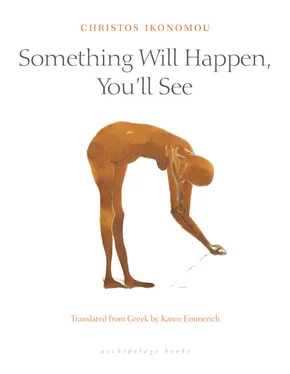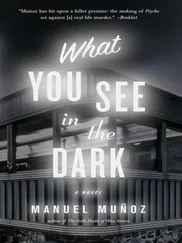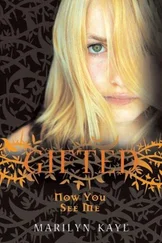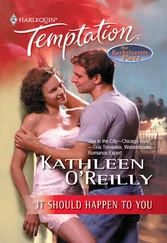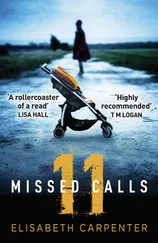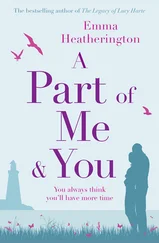• • •
He wouldn’t tell them his real name. He would make up some other name, more suited to the circumstance, a nice heroic name.
My name is Achilles. Achilles Palaiologos.
Or Alexander. Or Thrasyvoulos. Alexander the Great Thrasyvoulos Nikiforidis.
• • •
Someone would come and ask him about the placard and all the rest. For sure. Maybe some kid or old woman in black who knew a thing or two about death. Or maybe some drunk. Easter Monday was a holiday and on holidays people are different, they soften and open up and care about others about their fellow man.
Someone would come for sure.
Even if only out of pity.
It was Easter Monday, Christ had risen twice.
Someone would come.
And that someone might even bring him a piece of cold lamb to eat, a little wine or a red egg.
• • •
At three a car turned the corner. The man at the wheel slowed down and looked at Yiannis with his mouth hanging open, the way drivers on the highway stare at traffic accidents.
Then he stepped on the gas and left.
• • •
A piece of tape came loose from the cardboard and dangled in the air like a yellow tongue. He turned the placard on its side and stuck the tape back on, pressing it firmly with his thumb. It was shoddy work. If only he’d written something surely someone would have paid attention someone would have stopped out of curiosity to ask him what it was all about. It would have been better than nothing. But he couldn’t write anything. All the things he had inside, everything he was feeling, were like these fish he’d seen once on TV, strange fish that live deep down in a lake in Asia somewhere and when you take them out of the water and the sun hits them they rot right away and dissolve and disappear.
He couldn’t write anything on the cardboard.
There are certain things it’s hard to pull out from inside. Very hard. Impossible.
It’s like asking someone to cry from only one eye.
• • •
At four he saw a woman in the building across the street sneaking peeks at him from behind a curtain. When she saw him looking back at her the woman made a face as if she’d just discovered a stain on the carpet and yanked the curtain closed.
At five he wondered if there’s life after death and if Petros might be watching him now from somewhere, if he could see him standing there at the entrance to the building site with his hat on and the sign in his hands, and if with the wisdom of the dead Petros could possibly read all the things that Yiannis should have written on the cardboard.
Around five-thirty he thought: Petros died and nothing in the world can change that. Petros died and that won’t change anything in the world. How does a person face that. How.
The most frightening thing isn’t death but memories.
• • •
By evening it had started to rain.
One of the pieces of cardboard fell loose from the others and dropped to the ground and immediately shriveled up and turned black as if some kind of toxic fluid or poison had dripped on it.
He raised his collar and pulled his hat down low on his forehead and walked up and down for a little while to get warm looking at the deserted street, at the houses with lighted windows that seemed to be just as empty as the ones with no lights, looking at the black wires hanging overhead that emitted a constant hum as if they were relaying messages from a strange world to some other world. He circled the block then came back to his spot and stood there stiff as a rod holding the broomstick in both hands.
This, he thought, is the most pathetic, most ineffectual protest since the birth of the worker’s movement. Since the birth of the world.
I’m filled with an incredible emptiness.
If only I had written something.
I’m filled with an incredible emptiness.
If I had written some heroic words of mourning someone would have paid attention.
For sure.
But now it’s too late.
• • •
Late at night he lit a cigarette without putting the placard down. Then he inhaled deeply and straightened his back and lifted the placard which was falling apart and held it high and kept on holding it high, with both hands, even as he exhaled and saw the smoke coming thick and yellow from inside his chest and watched it slowly rise under the yellow street light and then disperse in the darkness like the smoke from some pitiful ancient offering that no one even noticed, neither gods nor people who believed in gods.
I USED TO WORK IN KAMINIA at a factory that made ice. I checked the machines, tossed the ice into sacks, carried the sacks out to the truck. An easy job, ludicrous, a job to be ashamed of. But Michalis, the guy who did the deliveries, saw it differently. He said there were few jobs as difficult as this one. He would grab one of those ice cubes with a hole in the middle — for some reason we called them crooks — and close his palm around it. Within seconds it would begin to melt. In a minute or two it was water. In five it had disappeared.
Isn’t that awful, he would say to me. To make something you know will be gone the very next moment. What an inhuman thing.
Shut up, Mike, I would say. Just stop thinking and work. Then I’d go to haul a few of those ten-kilo sacks we sent out to bars and restaurants. And he would trail after me somber and obedient as always looking at the palm of his hand which was bright red with cold.
Mi corathon, he would say. Mi corathon una naranha helada.
• • •
Ten months on the job and he still hasn’t adjusted. He’s a little off in other parts of his life, too. His folks died in a car accident when he was a kid. He’d been raised by some aunts out in the countryside. Later on he went to Romania to study medicine but came back after the first year — moneywise he couldn’t make it work. He wanted to be a pediatrician and open his own practice. But his biggest dream was Spain. That was his goal, to go there one day and not come back. I’m not from here, he used to say, I’m from Spain. He’d taught himself Spanish from cassette tapes. He always said there was no other language like it. It’s the happiest language in the world, he said, and when I finally get there I’ll talk and laugh all day long. Even at the factory, all day he would toss out those mi corathons and naranha heladas. He didn’t look anything like a Spaniard, though. You’d have thought he was from some northern country. Tall and blond, with green eyes and pale skin.
• • •
They’d hired him to be a driver but he did pretty much anything that came his way — electric stuff, plumbing, fixing the coolant. He learned fast, was quick on the uptake. He was a reader, too. He liked to read poems and used to carry a notebook around to scribble down all his strange thoughts. He saved and dreamed. He wanted to go back to Romania to finish his studies then head to Spain as soon as he was done. He said he’d find a Spanish woman with glossy hair and bright white teeth and they would travel the whole country together. They would go to where Don Quixote was from to see the windmills and the vineyards that stretched on as far as the eye could see. They would go down to the shores of the Guadalquivir and up to the Sierra Nevadas and to all those towns that Michalis had only seen on the map but whose names sounded so promising, Badajoz Almendralejo Villafranca de los Campaneros. Dreams. Dreams. For people like us dreams are like ice cubes — sooner or later they melt. But I never said anything.
Sometimes just to pass the time I’d ask him to tell me some poems. He knew lots of them, not just Greek but foreign ones, too. Of course he liked the Spanish ones best. There was one guy in particular, Miguel Hernández, whose name he said with a lisp, Hernándeth. He was crazy about that guy. He even had a photograph of him in his wallet, and knew his poems inside out, could say them by heart. Hernández had died young, when he was thirty or so. Most of his poems he’d written on toilet paper when he was in jail. He would tear the toilet paper into tiny pieces and write his poems on those little scraps. He was a communist and had fought in the civil war. After the war he was sentenced to death but he didn’t live long enough to be executed, tuberculosis finished him off first. Michalis’s favorite poem was Lullaby of the Onion. Apparently Hernández wrote it after he got a letter in prison from his wife where she wrote that she and their child — they had a baby boy eight months old — were living on nothing but onions and bread. They had nothing to eat except onions and bread. Onions and bread, that’s how poor they were.
Читать дальше
